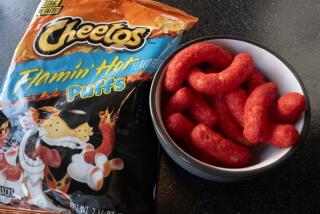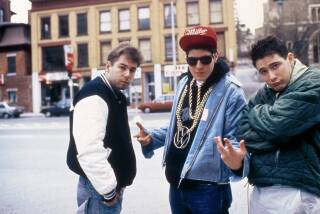Waits--Is Frito a Bandito?
- Share via
Is it Tom Waits or is it Memorex? That’s the bizarre question surrounding rock music’s latest product-endorsement controversy.
Waits, the gravelly voiced pop saloon singer whose albums regularly make critics’ Top 10 lists, has been an outspoken critic of rock’s involvement with corporate sponsorship. So imagine his surprise when friends began phoning him several weeks ago, inquiring about his new corn chip ad.
The 30-second radio spot, which plugs a new Frito Lay product called Salsa Rio Doritos, features a vocalist--and musical arrangements--which bear a striking resemblance to Waits’ distinctive gruff crooning style.
He didn’t hear the commercial himself until he was at a radio station doing an interview, Waits explained. “I was flabbergasted. I thought it was me! It was so well-crafted, it was like they did it with tracing paper.”
Though Waits is a performer known for his self-deprecating sense of humor, he was unhappy about the ad. “It’s a clear and insidious attempt to impersonate me without any attempt at a disclaimer. It’s not just an obvious impression--it’s stealing. They clearly want people to believe that it’s me, or they wouldn’t have gone to such detail to impersonate me. The whole thing is maddening. I’ve always been open in my opposition of pop endorsements, and now people are calling me up--thinking I’ve done this ad--saying I’m a hypocrite.
“For me, the beauty of being a musician is that you had a chance to be independent, to have sovereignty. . . . So it’s really strange to see myself as the target of some covert demographic strategy.”
Waits’ philosophy: Don’t get mad, get even. His attorney, Howard King, says the ads are no longer airing here. But King says he has asked Frito Lay to provide him with a detailed account of the firm’s marketing plans and expenditures on the ad campaign.
“We’re hopeful that we won’t have to file a lawsuit,” said King. “But if we opt for a settlement, it would require Frito Lay to pay Tom ample compensation for his damages. We feel California law allows him to complain--by imitating someone who’s been so vocal in opposing endorsements, it makes him appear to have sold out. I’ve heard the commercials--and they are so close to his voice that it’s difficult to believe that they were not a deliberate imitation.”
Kim Branthoover, an account executive at Tracy Locke, the Dallas ad agency that produced the spot, said Frito Lay does “not allow us to talk to the press.” However, in a brief interview, she said the ads were not intended to mimic Waits, though she acknowledged, “I understand how you could see that as one interpretation.”
Branthoover referred Pop Eye to a Frito Lay consumer affairs exec, who did not return several phone calls.
If Waits takes the case to court, what are his chances of winning? When celebrity look-alikes are involved in TV commercials, firms must air a disclaimer informing viewers of the use of a celebrity impersonator. But how protectable is someone’s voice--or vocal style?
“Six months ago I would’ve told Waits to save his money--he wouldn’t have a chance,” said Peter Paterno, a prominent music industry attorney. “But several months ago the Ninth Circuit Court found that Bette Midler had a right to complain when a company used someone to impersonate her singing ‘Do You Wanna Dance,’ a song clearly associated with her.
“The court ruled in her favor, but more importantly, found that an artistic persona is a protectable--and valuable-- property right. Now if Frito Lay can prove they weren’t explicitly intending to imitate Waits’ voice, maybe they’re off the hook. But if Waits can prove he possesses a unique vocal style, which this firm mimicked, then he seems to have a good case.”
More to Read
The biggest entertainment stories
Get our big stories about Hollywood, film, television, music, arts, culture and more right in your inbox as soon as they publish.
You may occasionally receive promotional content from the Los Angeles Times.










